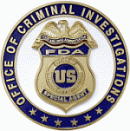Inspections, Compliance, Enforcement, and Criminal Investigations
January 27, 2009: Robert McFadden, Palm Springs Attorney, Convicted in Prescription Drug Diversion Trial
|
U.S. Department of Justice Press Release
|
|---|
For Immediate Release January 27, 2009 | United States Attorney District of New Hampshire Contact: Thomas P. Colantuono United States Attorney Aixa Maldonado-Quinones Assistant U.S. Attorney Sarah Hawkins Special Assistant U.S. Attorney (603) 225-1552 |
|---|
CONCORD, NEW HAMPSHIRE: United States Attorney Tom Colantuono, Acting Special Agent in Charge of the IRS Office of Criminal Investigations JoAnn Zuniga, and Resident Agent in Charge of the FDA Office of Criminal Investigations Mark Dragonetti, announced the conviction of Attorney Robert McFadden of Palm Springs, California by a jury sitting in U.S. District Court in Concord, New Hampshire. The jury convicted McFadden of Conspiracy to Launder Monetary Instruments, Conspiracy to Commit Wire Fraud, and Conspiracy to Engage in Unlicensed Wholesale Distribution of Prescription Drugs. Attorney McFadden had been charged in an indictment which alleged a scheme where large quantities of Serostim, an HIV drug, were illegally purchased from illegitimate sources and then illegally distributed to wholesale distributors using falsified paperwork. The maximum penalties for the counts charged in the indictment are between five and twenty years. The evidence introduced at trial revealed that Serostim was purchased from illegitimate sources in Palm Springs and Los Angeles, California at prices significantly below the price that the manufacturer charges pharmacies. Specifically, the Serostim was purchased from HIV infected patients and then reintroduced into the wholesale distribution chain by using false documentation to make it appear that it had come from legitimate licensed wholesalers when in fact it previously had been dispensed to HIV infected patients. In furtherance of the scheme, McFadden used his client trust account to receive money from licensed wholesalers of prescription drugs who purchased the Serostim from a licensed wholesaler of prescription of drugs based in Milford, New Hampshire. The client trust account was also used to pay the illegal suppliers of the Serostim by purchasing cashiers checks drawn at a branch of Washington Mutual Bank in Palm Springs, California. Over $2.1 million dollars was funneled through McFadden’s client trust account in furtherance of the scheme. The Serostim was in turn distributed to pharmacies and prescribed to HIV infected patients throughout the United States. Serostim is an injectable drug manufactured by Serono, Inc., of Massachusetts, and is approved for the treatment of AIDS-wasting syndrome in HIV infected patients. Serostim is distributed in a secured distribution network whereby the manufacturer ships the drug directly to pharmacies who have contracts with Serono, Inc. These pharmacies then dispense the drug directly to patients. The Prescription Drug Marketing Act (“PDMA”) requires wholesale distributors of prescription drugs to be licensed by the states in which they operate. Pursuant to the PDMA, the FDA enacted minimum state guidelines for state licensing of wholesale distributors of prescription drugs. The PDMA generally requires wholesale distributors of prescription drugs to provide to the recipient of the drugs a statement indicating each prior sale of the drug including the names of all parties to the transactions. This statement is generally referred to as the “drug pedigree.” The minimum state guidelines and the drug pedigree requirement are designed to eliminate potential risks to the public health by protecting the integrity of the drug distribution system. U.S. Attorney Colantuono stated, “This office takes these cases seriously because of the threat to public safety. When prescription drugs are handled by entities who are not trained to handle prescription drugs in the appropriate manner and in regulated locations, this poses a serious risk to the ultimate consumer of the product, the patient. The case was investigated by Special Agents of the Food and Drug Administration, Office of Criminal Investigations and the Internal Revenue Service. The case is being prosecuted by Special Assistant U.S. Attorney Sarah Hawkins and Assistant U.S. Attorneys Aixa Maldonado-Quinones and Mark Irish. # # #
|








